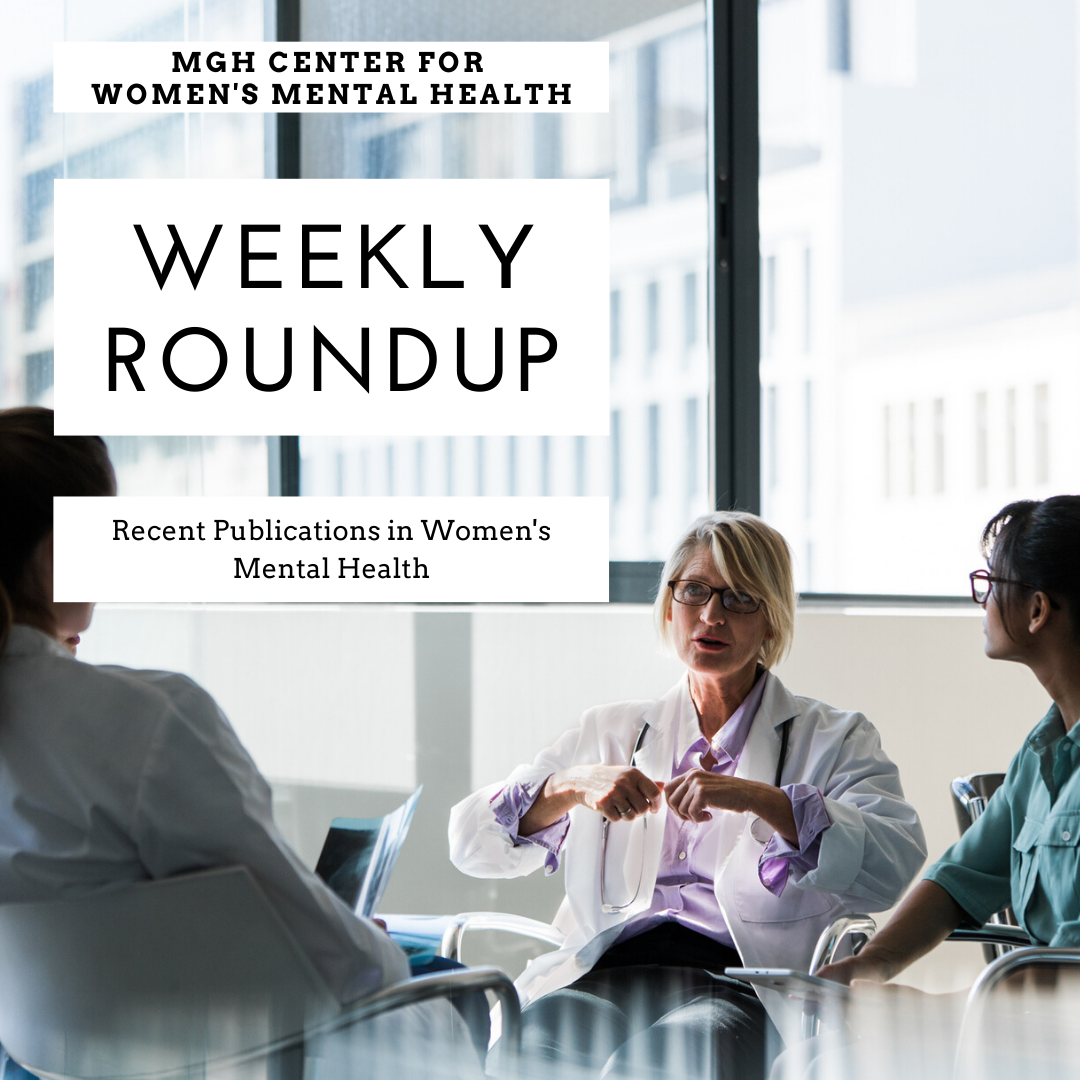
Every week we review the most recent publications in women’s mental health, covering topics related to premenstrual symptoms, perinatal mood and anxiety disorders, use of medications in pregnant and breastfeeding women, perinatal substance use, and menopausal mental health.
For more detailed descriptions of many of these topics, you can sign up to receive our weekly CWMH NEWSLETTER which comes out every Thursday.
And don’t forget to visit ESSENTIAL READS – a curated selection of up-to-date and clinically relevant articles in women’s mental health.
Ruta Nonacs, MD PhD
PMS AND PMDD |
| No articles this week
|
INFERTILITY AND MENTAL HEALTH |
| No articles this week
|
PSYCHIATRIC ILLNESS DURING PREGNANCY |
| No articles this week
|
MEDICATIONS AND PREGNANCY |
| Sadat-Hossieny Z, Robalino CP, Pennell PB, Cohen MJ, Loring DW, May RC, Block T, Swiatlo T, Meador KJ; NEAD Investigator Group. Folate fortification of food: Insufficient for women with epilepsy. Epilepsy Behav. 2021;117:107688. Dietary content of folate, even in a country where food is fortified with folic acid, is not sufficient to provide improved cognitive outcomes for children of women taking anti-epileptic drugs during pregnancy. Folate supplementation is needed for significant improvement in cognitive outcomes, specifically IQ.
Meador KJ, Cohen MJ, Loring DW, May RC, Brown C, Robalino CP, Matthews AG, Kalayjian LA, Gerard EE, Gedzelman ER, Penovich PE, Cavitt J, Hwang S, Sam M, Pack AM, French J, Tsai JJ, Pennell PB; Maternal Outcomes and Neurodevelopmental Effects of Antiepileptic Drugs Investigator Group. JAMA Neurol. 2021 Jun 7. Outcomes of children at 2 years of age did not differ between children of women with epilepsy taking antiepileptic drugs and children of healthy women. Most women were taking lamotrigine and/or levetiracetam. Voges J, Berg A, Niehaus DJH. Afr J Reprod Health. 2020 Dec;24(4):58-68.
|
POSTPARTUM PSYCHIATRIC ILLNESS |
| Postpartum mental illness during the COVID-19 pandemic: a population-based, repeated cross-sectional study.
Vigod SN, Brown HK, Huang A, Fung K, Barker LC, Hussain-Shamsy N, Wright E, Dennis CL, Grigoriadis S, Gozdyra P, Corsi D, Walker M, Moineddin R. CMAJ. 2021 Jun 7;193(23):E835-E843. Free article. Increased visits for mental health conditions among postpartum people during the first 9 months of the COVID-19 pandemic suggest an increased need for effective and accessible mental health care for this population as the pandemic progresses.
|
MEDICATIONS AND BREASTFEEDING |
| Adverse effects and short-term developmental outcomes of infants exposed to atypical antipsychotics during breastfeeding.
Sinha SK, Kishore MT, Thippeswamy H, Kommu JVS, Chandra PS. Indian J Psychiatry. 2021 Jan-Feb;63(1):52-57.
|
PERINATAL SUBSTANCE USE |
| Association Between Prenatal Opioid Exposure and Neurodevelopmental Outcomes in Early Childhood: A Retrospective Cohort Study.
Wen X, Lawal OD, Belviso N, Matson KL, Wang S, Quilliam BJ, Meador KJ. Drug Saf. 2021 Jun 7. In pregnant women without opioid use disorders or drug dependence, maternal opioid use was not associated with increased risk of neurodevelopmental disorders in early childhood. However, increased risks of early neurodevelopmental disorders were observed in children born to women receiving prescription opioids for longer duration and at higher doses during pregnancy.
|
MATERNAL MENTAL HEALTH AND CHILD OUTCOMES |
| Trajectory of Maternal Postpartum Depressive Symptoms Moderates the Bidirectional Associations between Maternal Intrusive Parenting and Infant Fear.
Wu Q, et al. J Affect Disord, June 2021. When mothers had low levels of depressive symptoms, higher levels of intrusive parenting by the mother predicted a faster increase in infant fear. When mothers’ depressive symptoms showed a fast increase, higher levels of infant fear predicted a faster reduction in intrusive parenting.
|
MENOPAUSE AND MENTAL HEALTH |
| The Cortisol and ACTH response to Dex/CRH testing in Women with and without Perimenopausal Depression.
Guerrieri GM, Ben Dor R, Li X, Wei SM, Martinez PE, Neiman LK, Rubinow DR, Schmidt PJ. J Clin Endocrinol Metab. 2021 Jun 7. Despite reports of increased stress responsiveness in perimenopausal depression (PMD), we observed no abnormalities of HPA axis activity associated with PMD compared with women without depression. These findings suggest that PMD is not uniformly associated with HPA dysregulation and could reflect underlying pathophysiologic processes that are distinct from women with non-reproductive-related depressions. Solomon DH, Ruppert K, Habel LA, Finkelstein JS, Lian P, Joffe H, Kravitz HM. BMJ Open. 2021 May 11;11(5):e045074. Free article. These analyses suggest that women who initiated sleep medications rated their sleep disturbances similar after 1 and 2 years. The effectiveness of long-term sleep medication use should be re-examined.
|
OTHER TOPICS IN WOMEN’S MENTAL HEALTH |
| No articles this week |



Leave A Comment